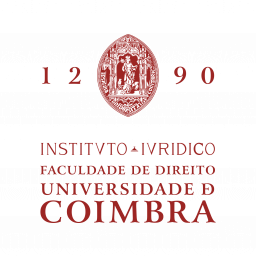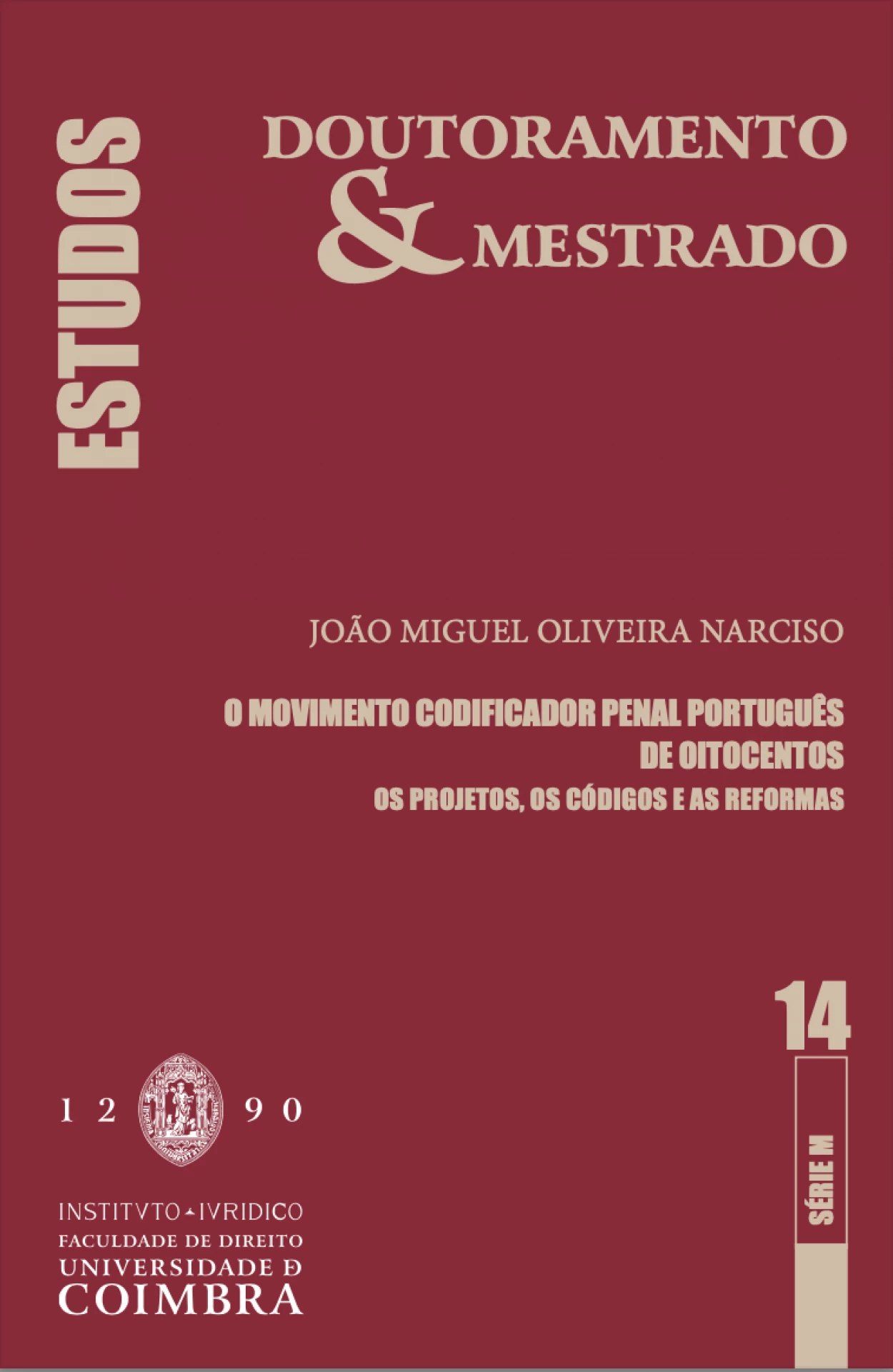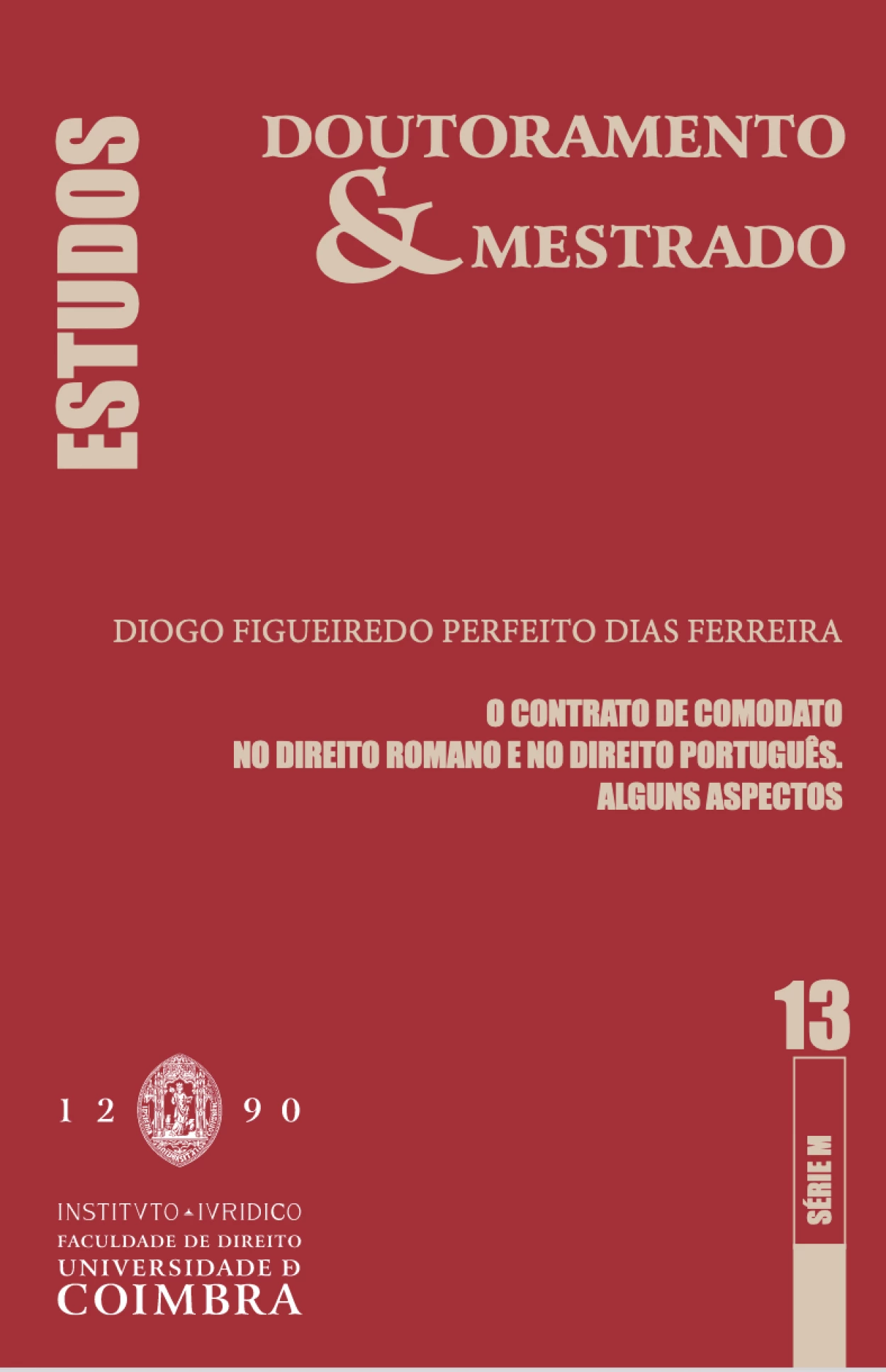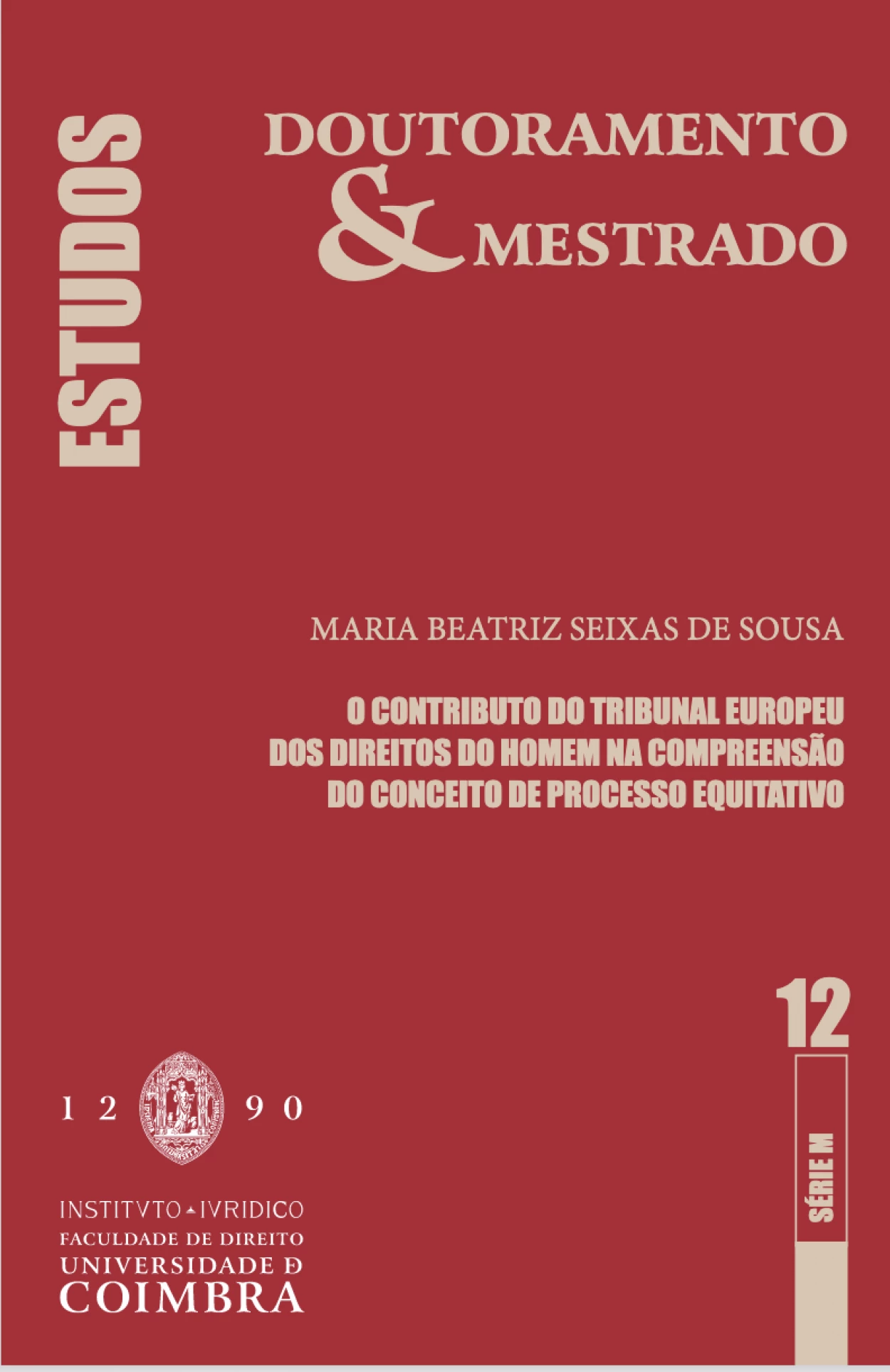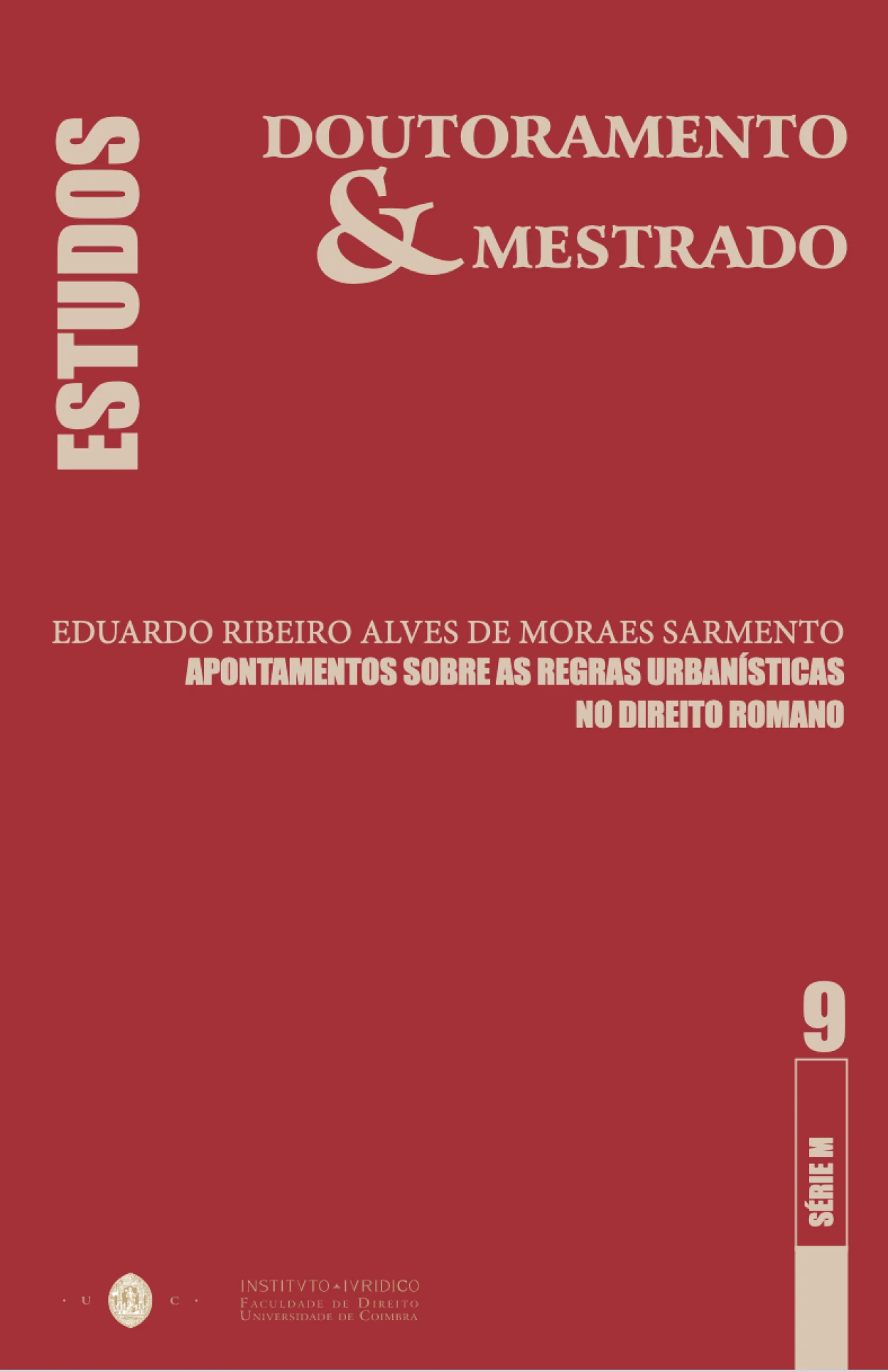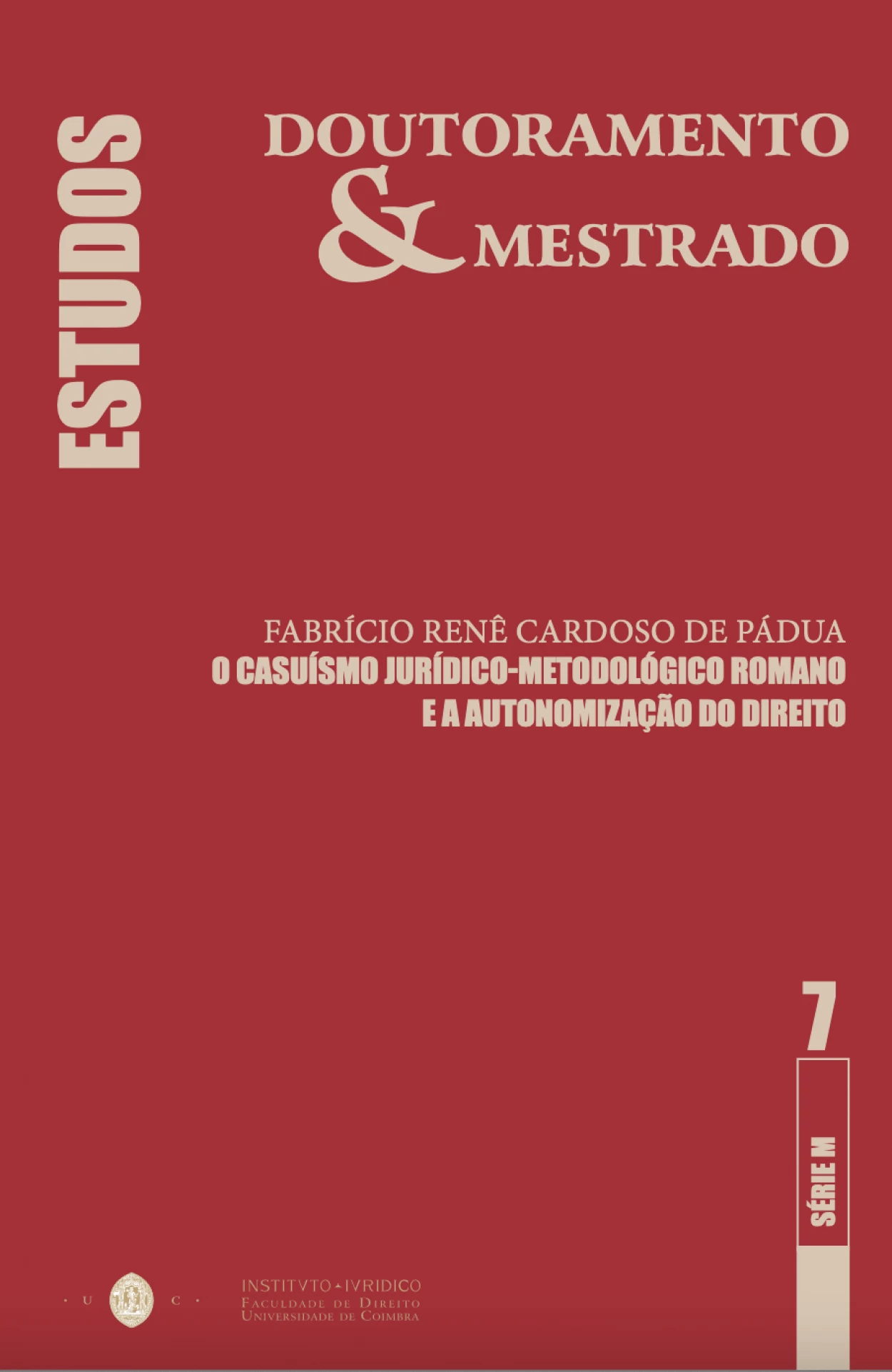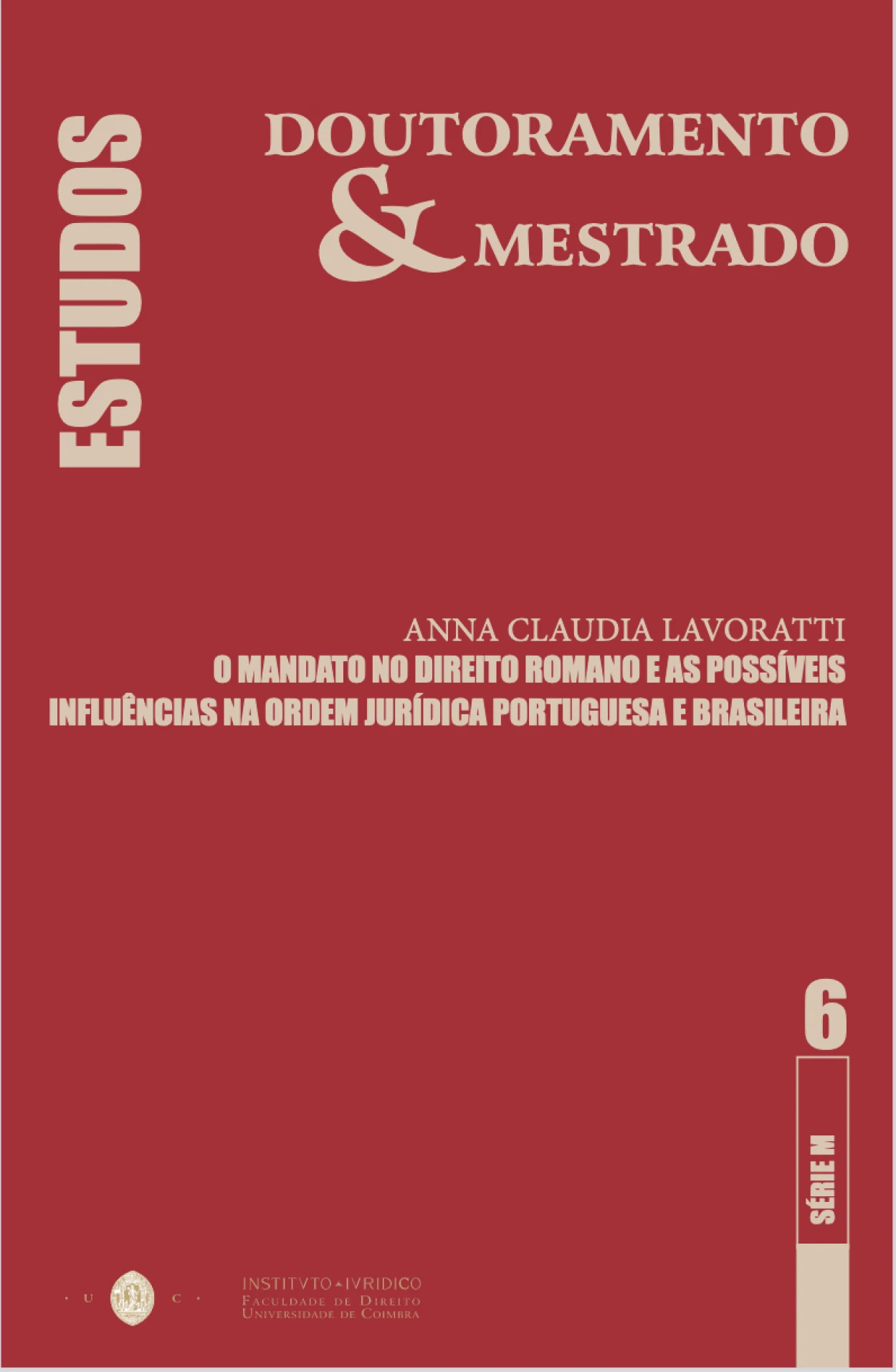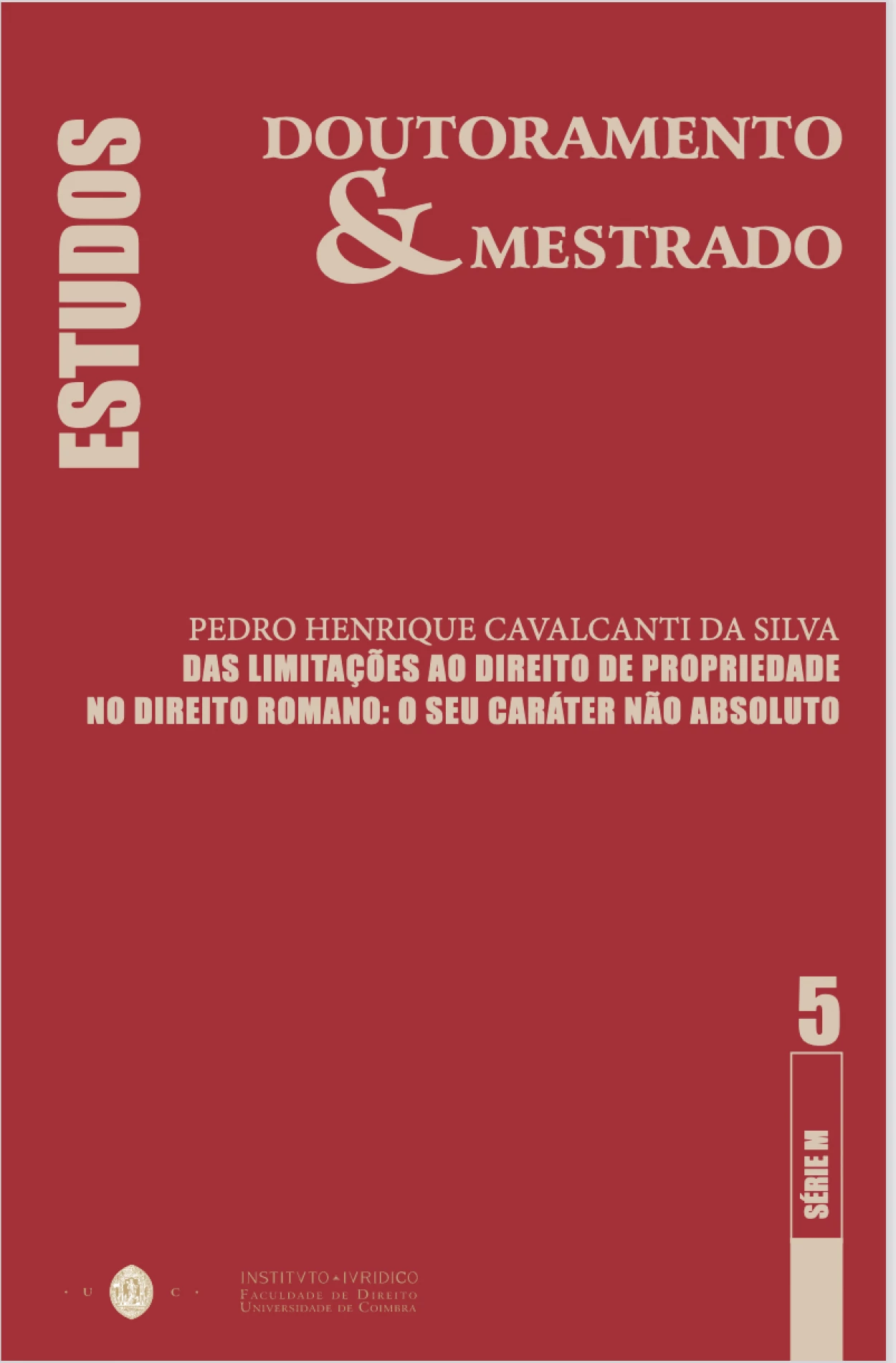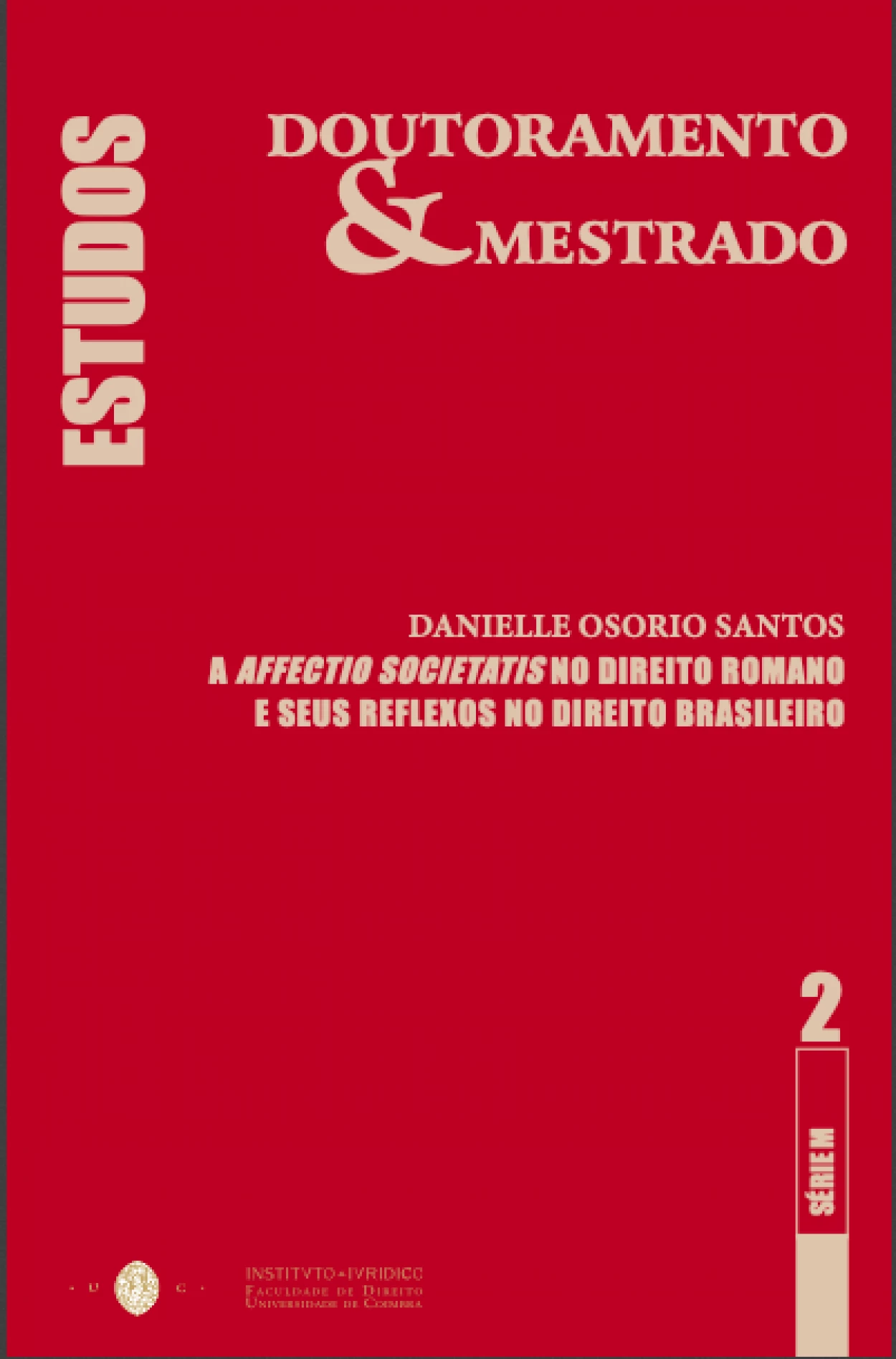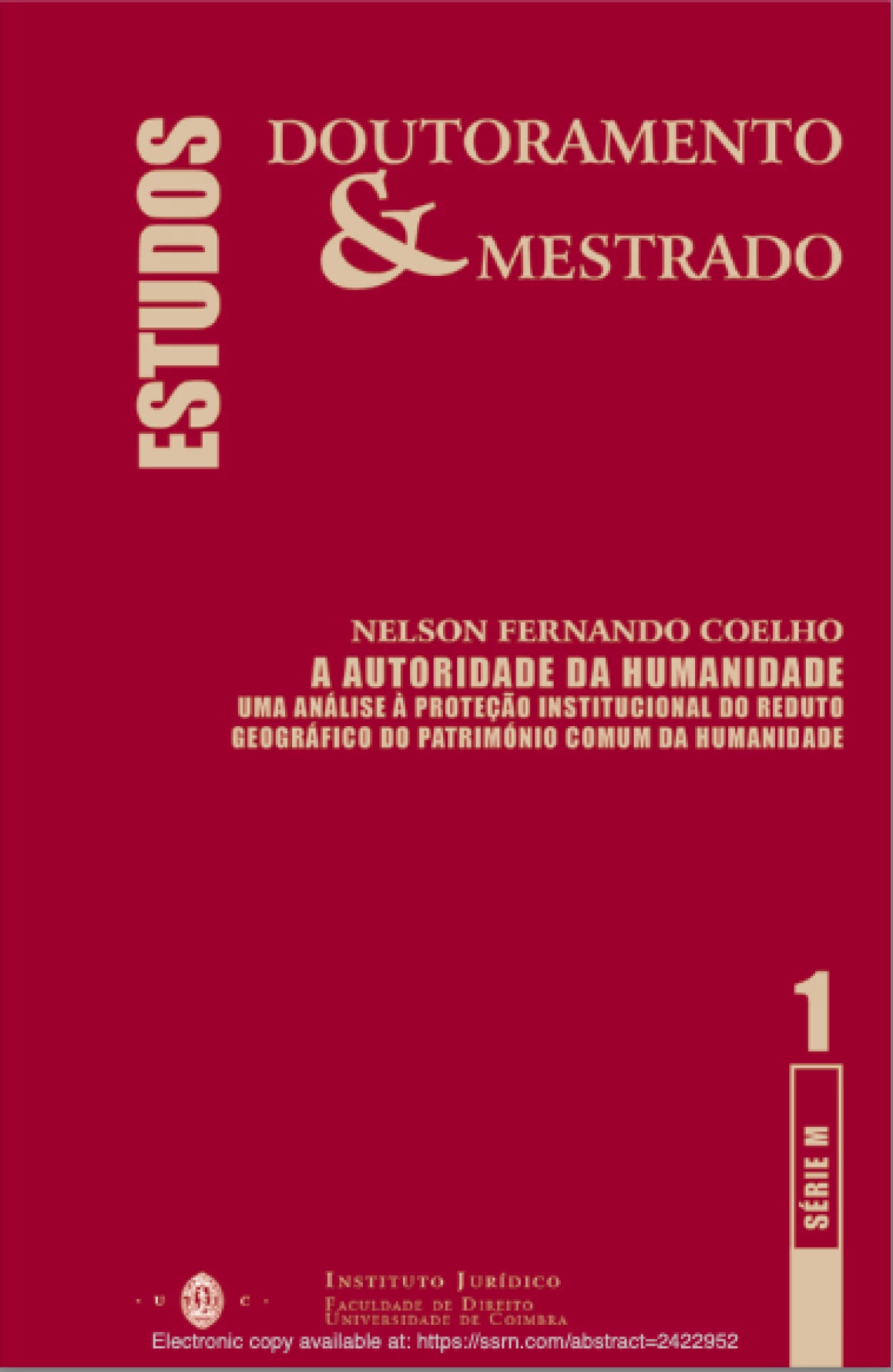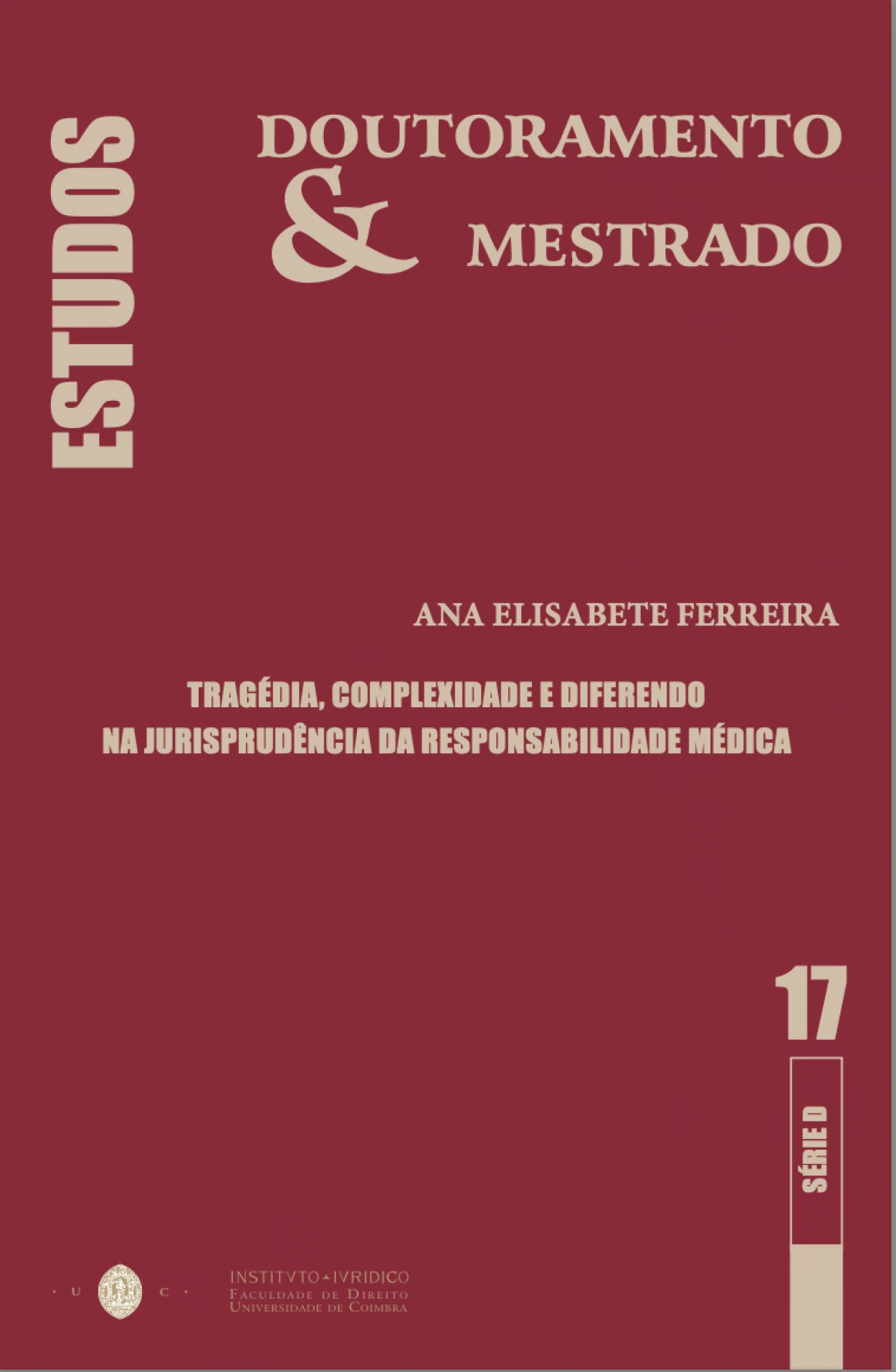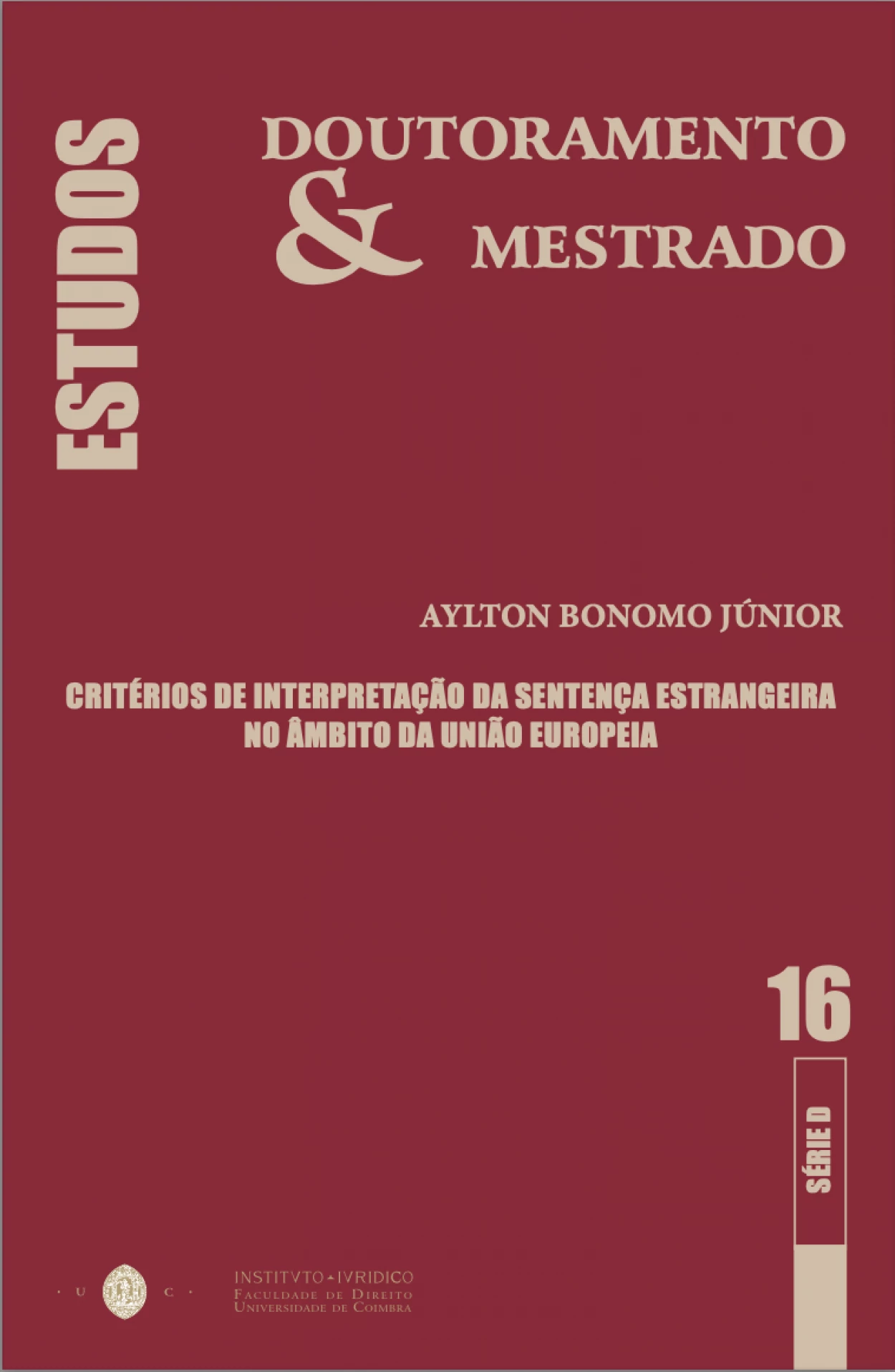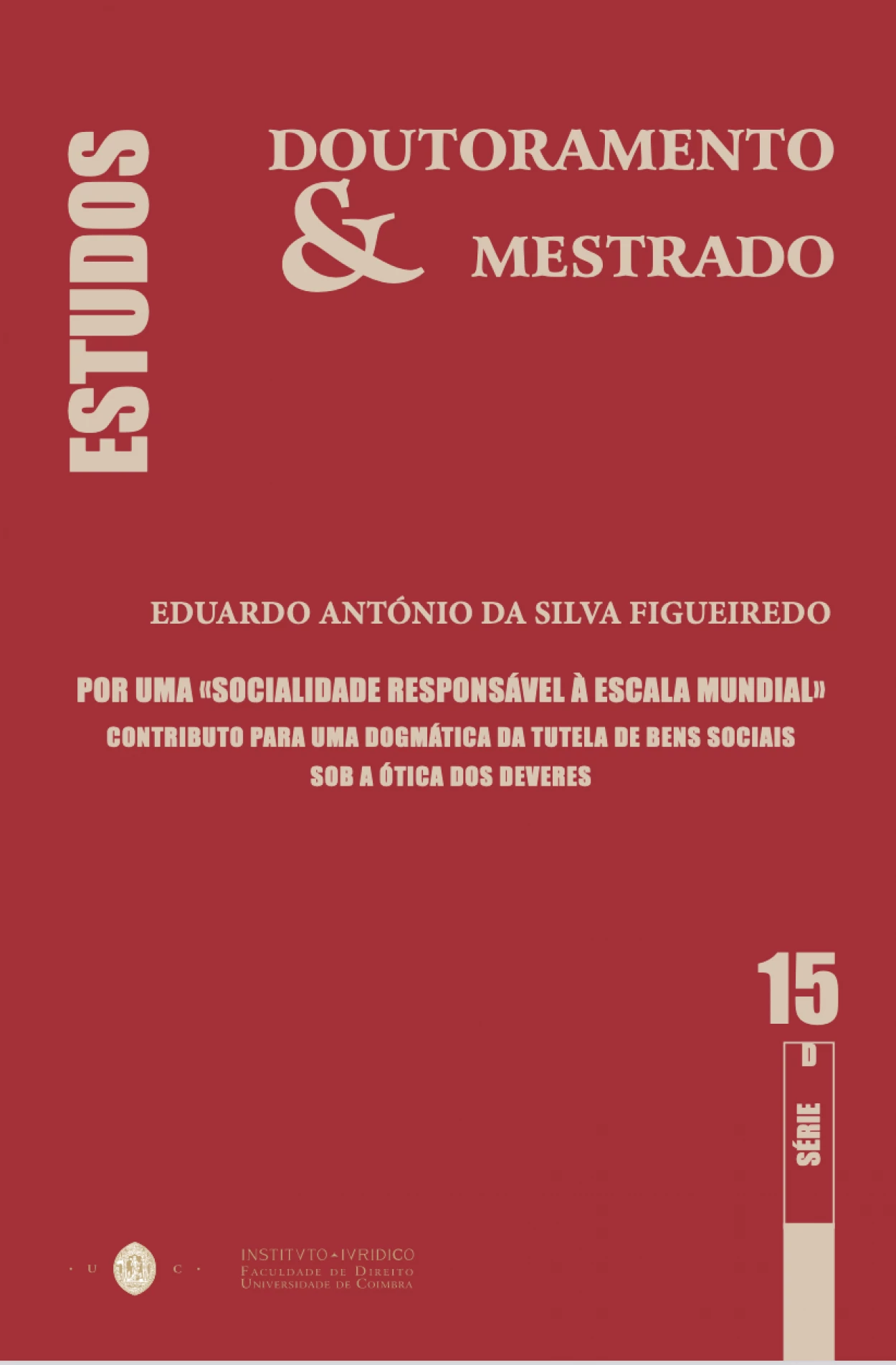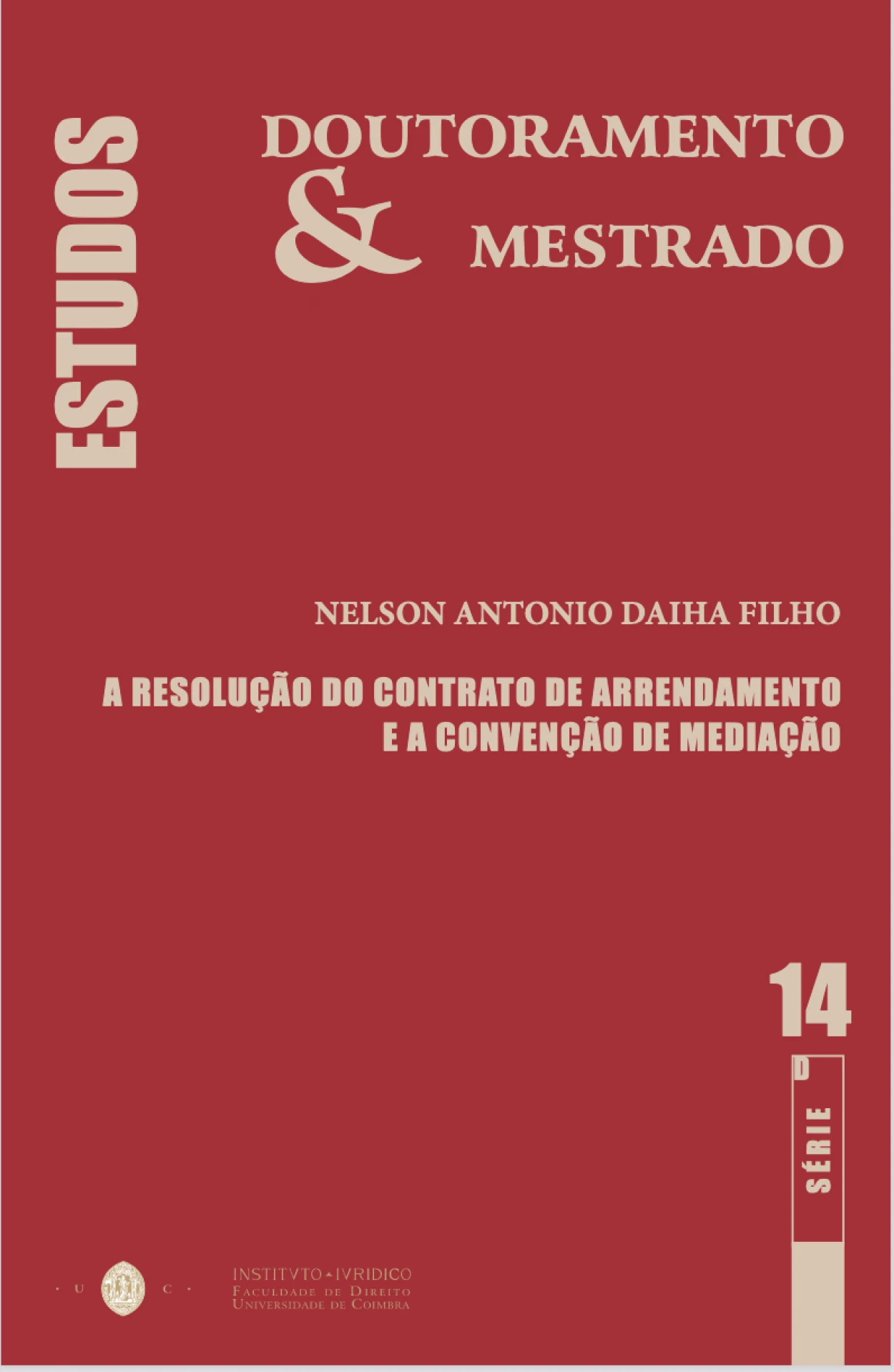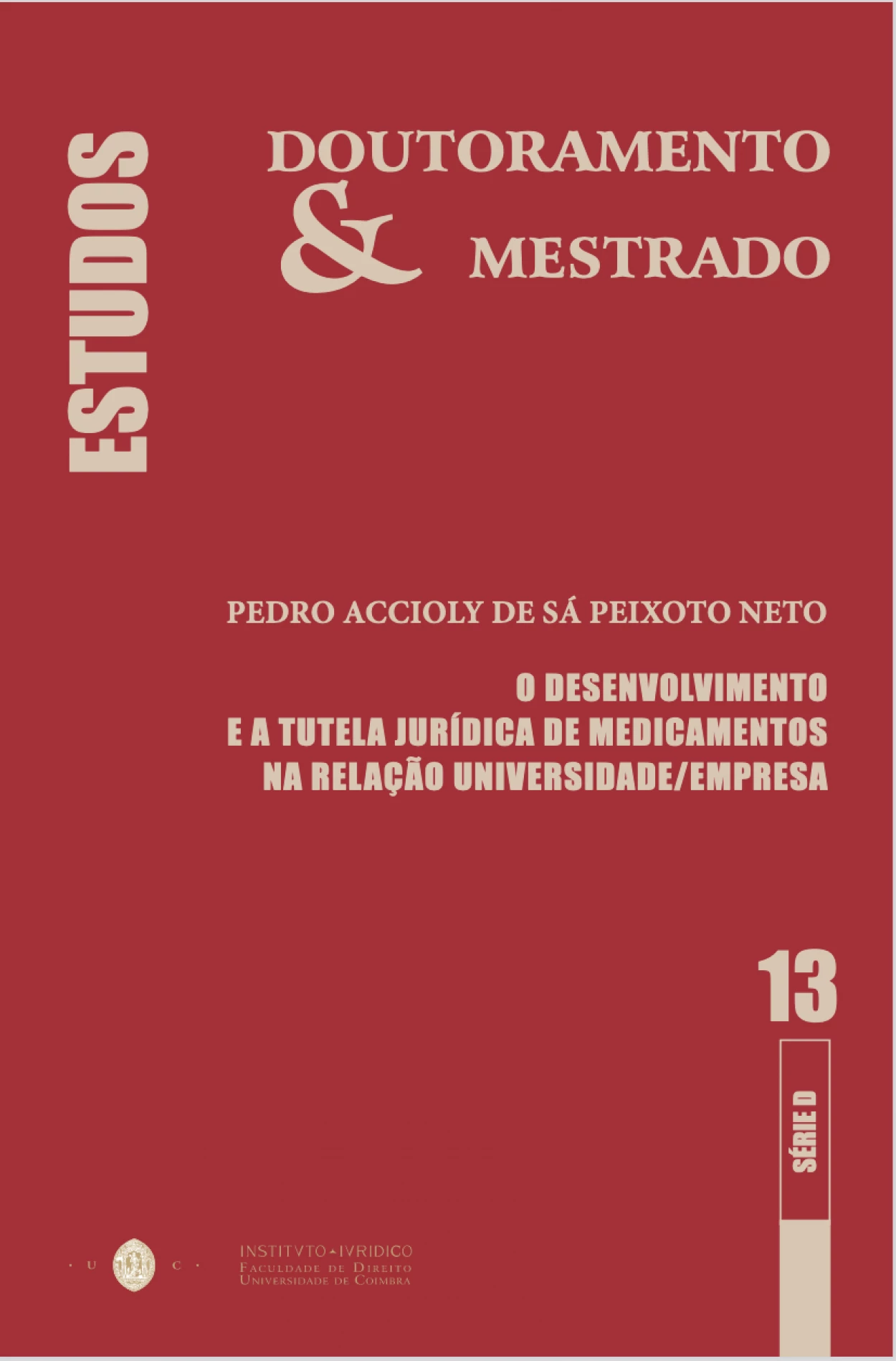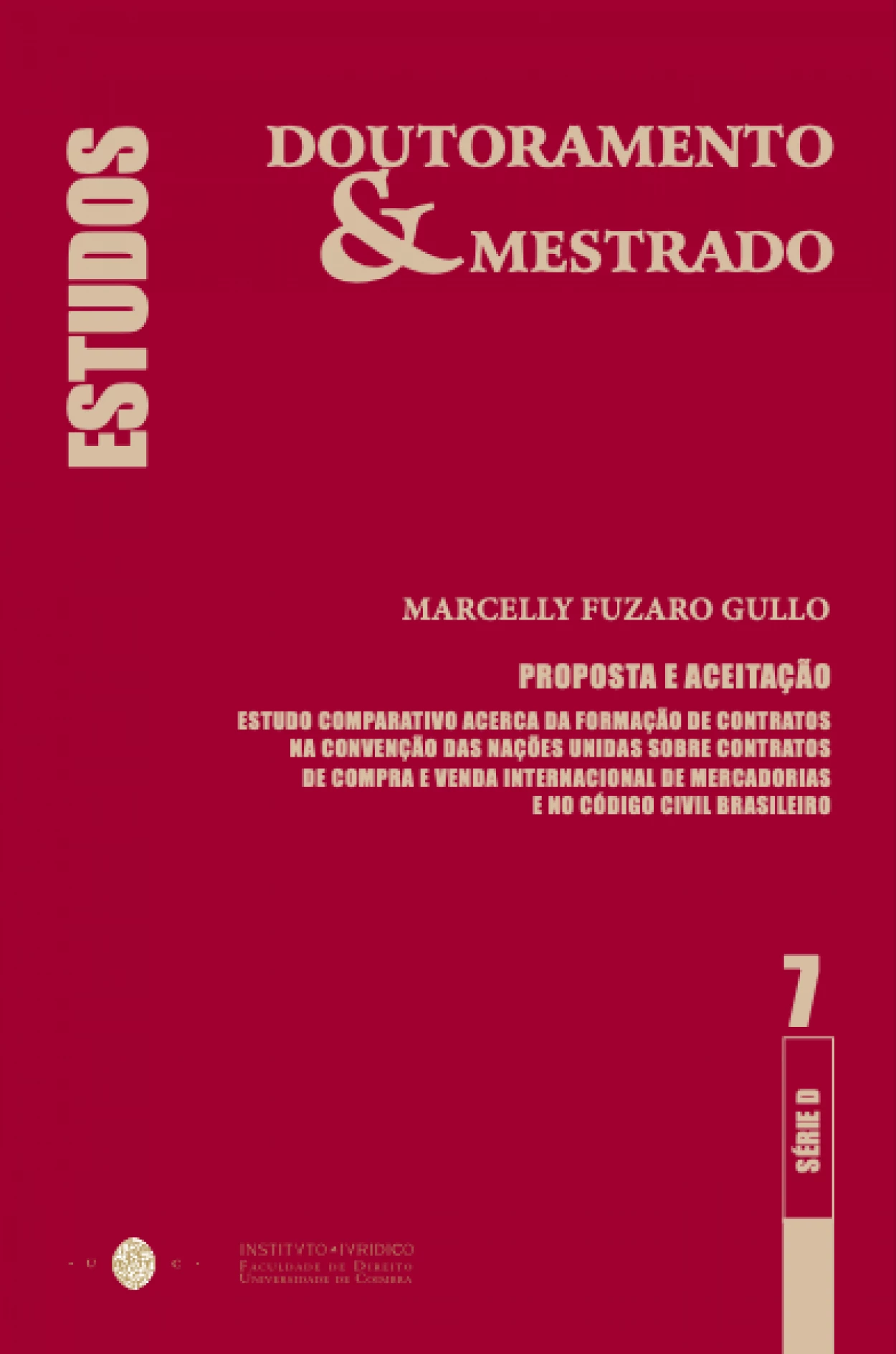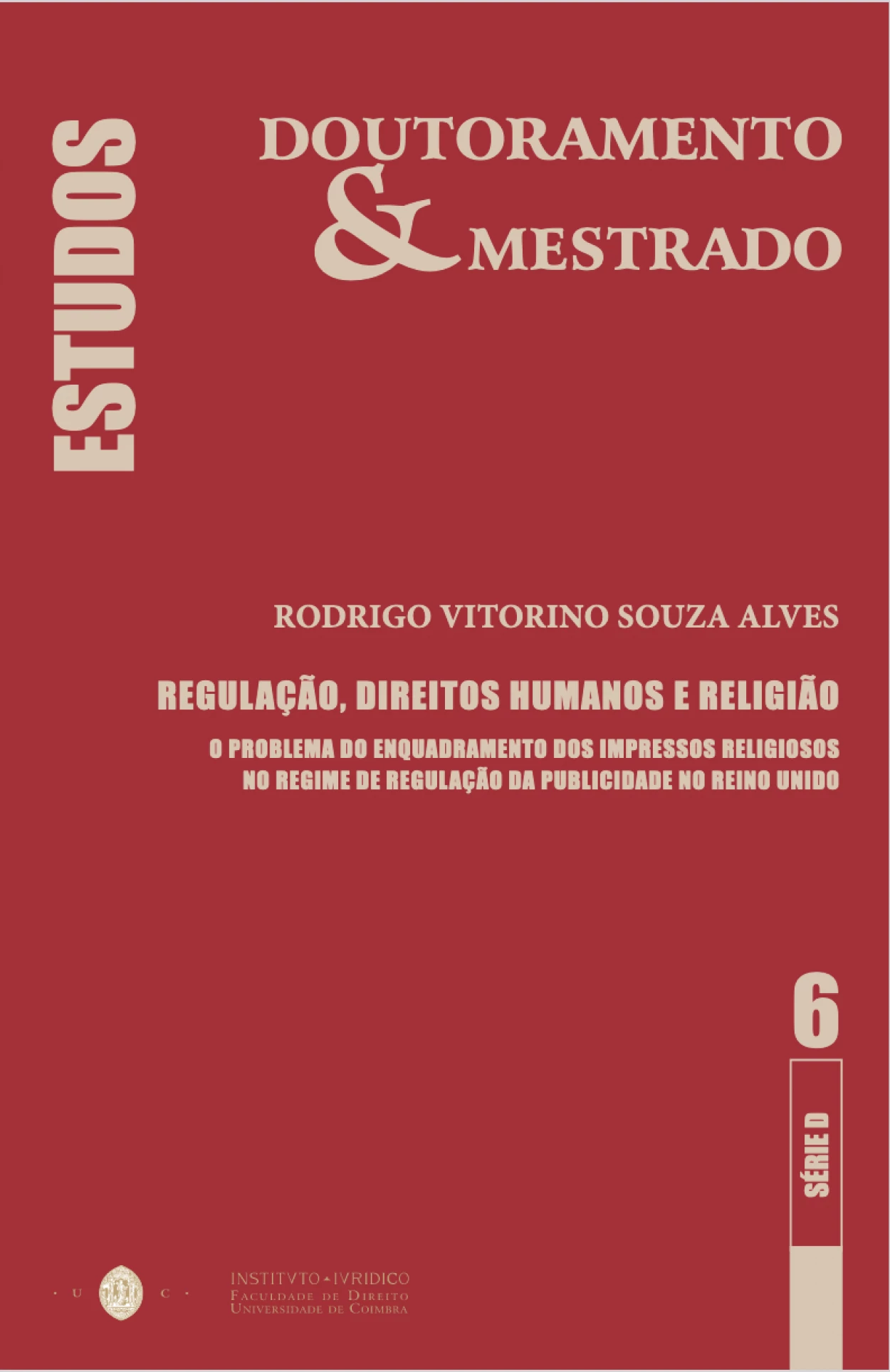Publications - Masters and PhD Studies
Masters (M) and PhD (D) Studies is a series with scientific arbitration that brings together part of the research resulting from Master's and Doctoral seminars.
M Series
M.14. The Portuguese Penal Codification Movement of the nineteenth century: the Projects, the Codes and the Reforms
Author: João Miguel Oliveira Narciso
ISBN: 978-989-9075-27-6
Year: 2022
Abstract: The Portuguese penal codification movement of the nineteenth century, which was strongly influenced by the Enlightenment, was not limited to the Penal Code of 1852, since it saw not only numerous projects, but also reforms that introduced significant modifications. Thus, after drawing the codification general lines and presenting the framework of the legal order in the period preceding Liberalism, we will see that in the national criminal law reform movement of the 19th century only one codification took place and that many of the legislative preparatory works had repercussions on subsequent legislation.
M.13.The Commodate Contract in Roman and Portuguese Law. Some Aspects
Author: Diogo Figueiredo Perfeito Dias Ferreira
ISBN: 978-989-8891-90-7
Year: 2020
Abstract: This article essays to review some essential attributes of a contract very significant at Portuguese civil law: the commodate contract. With this object, we try, firstly, to make a draft of the commodatum contract in Roman law, basis of the Portuguese contract of comodato. After that, we analyse the characteristics of this contract in Portuguese Civil Codes of 1867 and 1966, not forgetting many Romanistic traces visible in these codifications.
M.12. The Contribution of the European Court of Human Rights Towards the Understanding of the Fair Trial Concept
Author: Maria Beatriz Seixas de Sousa
ISBN: 978-989-8891-61-7
Year: 2020
Abstract: Human rights are no longer invoked only in constitutional jurisdiction, but have spread their influence to civil procedure, criminal procedure and even to administrative proceedings and procedures. The possibility of relying autonomously before the courts of law on the Convention for the Protection of Human Rights and Fundamental Freedoms (echr) demonstrates the growing importance of the Convention in the domestic legal system. The approximation of our legal order with the human rights provided for in the echr is a function of the legislator, who must not disregard or comply with the constant condemnations of the Portuguese State, before the European Court. We will address the concept of fair trial by comparing the concept propagated by the European Court of Human Rights (ECtHR), following the provisions of the European Convention on Human Rights, and the concept contained in various provisions of domestic law. We believe that the deepening knowledge of ECtHR case law by the courts and the maturation of the courts in this European system of human rights protection will enable the echr to be increasingly mobilized.
M.11. Legal Aspects Jurídicos of Post Mortem Medically Assisted Reproduction
Author: Ana Raquel Ribeiro
ISBN: 978-989-8891-64-8
Year: 2020
Abstract: The subject of post mortem reproduction continues to be debated in the doctrine, and many legal systems still remain with no answer to the legal problems involved. Can a person provide her genetic material after her death? Can cryopreserved embryos be used, when one member of the couple has died? Does the child born in this context have inheritance or filiation rights, with regard to their deceased father? These are some of the questions which we will try to give an answer to, in this scenario where life and death, two conflicting subjects, are intrinsically linked.
M.10. The Authorship Issue in Artificial Intelligence Generated Works
Author: Pedro de Perdigão Lana
ISBN: 978-989-8891-58-7
Year: 2019
Abstract: The development of new technologies caused deep impacts on copyright, notably the changes induced by the rise of information society and the internet. Advances in artificial intelligence tools have posed major challenges in this scenario, and today it is important to answer the question of authorship of works generated with minimal (or none at all) human intervention and the resulting (in)existence of copyright protection. A brief analysis of the doctrine and jurisprudence of various legal systems (focusing on Portugal, European Union and the United States) is carried out in this research. This investigation concludes that there is no direct protection, aiming at strengthening the public domain and culture accessibility. However, it is still possible to think of other ways to reward the development of creative programs and dissemination of those works.
M.9. Notes on Urban Planning Rules in Roman Law
M.8. Protocol nº 16 of the ECHR On the Way towards Institutionalizing Judicial Dialogue with the Strasbourg Court?
Author: Eduardo António da Silva Figueiredo
ISBN: 978-989-8891-28-0
Year: 2018
Abstract: The dawn of the Third Millennium is pronounced by the gradual de-territorialization of Law, now conceived “in network” and developed under diverse dialogic practices. In the “European arena” it is possible to identify an authentic dialogic triad (ecthr, ecj and cc’s and similar bodies) on which the protection (today, truly multilevel) of Fundamental and Human Rights is sustained. However, the relationship between the various overlapping legal orders is far from peaceful and is marked with strong tensions and conflicts that threaten the effective protection of individual rights and freedoms, requiring greater and better dialogue. In this context, Protocol no. 16 to the echr, qualified as “the Protocol of Dialogue”, allows, under specific conditions, the “highest courts and tribunals of a High Contracting Party” to request the ecthr to give advisory opinions on questions of principle relating to the interpretation or application of the rights and freedoms defined in the Convention or the protocols thereto. Two more ratifications are needed until the Protocol enters into force, but still we think this is the right moment to reflect on the content of the document, its advantages and disadvantages, and ask ourselves: what are we waiting for to take the step forward and take seriously the idea of judicial dialogue within the pan-European framework?
M.7. The Autonomy of Law and the Roman Juridical-Methodological Casuistry
Author: Fabrício Renê Cardoso de Pádua
ISBN: 978-989-8891-27-3
Year: 2018
Abstract: This paper studies the factors that led the Law to arise in Rome as an epistemologically autonomous science. It examines the particular way in which Roman Law, in departing from morality, religion, politics and philosophy, came to be considered an independent science that has its own object of study. It notes that the emergence of the Law is not confused with its positivation in texts. Checks that the ius is unveiled in Rome in a casuistic way through praxis. It concludes that law arises in Lazio through judicial practices as a way of achieving, in an equitable way, the fairer solution for the plaintiffs.
M.6. The Mandate in Roman Law and the Likely Influences in the Portuguese and the Brazilian Legal Order
Author: Anna Claudia Lavoratti
ISBN: 978-989-8891-25-9
Year: 2018
Abstract: Considering that the juridical framework of Portugal and, consequently, of Brazil, were erected under the influence and roots of the Roman culture, the objective of the present study is to carry out an analysis of a typically Roman contractual figure that is regulated in both orders, that is, the mandate, in order to verify, through a comparative observation of the main characteristics, if the vestiges of Roman law are still present.
M.5. On the Limitations to the Right of Property in Roman Law: Its non Absolute Character
Author: Pedro Henrique Cavalcanti da Silva
ISBN: 978-989-8891-24-2
Year: 2018
Abstract: When we are dealing with the right to property, it is fundamental and elementary to think about its original perspective, and this brings us back to Roman law. The present work is intended to demystify the myth of property as an absolute right, by drawing upon the ius romanum. Property, while not having a concept of its own at the time, has manifestly undergone limitations from private, religious and public interests. Drawing upon the Roman Law sources themselves, we intend to demonstrate the fallacy of the right of property as an absolute right.
M.4. A Proposta da Acção 6 do Plano BEPS da OCDE: Problemas de Compatibilidade dom o Direito da União
Autoria: Hélder Vilela
ISBN: 978-989-8787-69-9
Ano: 2016
Resumo: A OCDE, no seu plano de combate à erosão da base tributária e “profit shifting”, inclui uma acção relativa ao uso indevido de convenções com vista à prevenção da dupla tributação. Neste trabalho analisamos a proposta avançada pela OCDE neste âmbito. Começamos por dar uma perspectiva geral do problema do abuso de convenções e do “treaty shopping”, e ainda de um dos métodos mais utilizados para combater estes abusos – a cláusula de limitação dos benefícios. Analisamos a admissibilidade, em geral, de uma cláusula de limitação de benefícios perante a jurisprudência do Tribunal de Justiça da União Europeia, e ainda a admissibilidade de cada um dos “testes” que a proposta da OCDE inclui. Concluímos que a proposta da OCDE precisa de importantes ajustamentos para se tornar compatível com o Direito da União.
M.3. O Princípio da Integração Ambiental e a Simplificação do Estado
Autoria: Rafael Lima Daudt d’Oliveira
Ano: 2015
Resumo: Estuda o princípio da integração ambiental tendo como foco um de seus principais pressupostos, que é a simplificação administrativa. Discorre sobre o princípio da integração ambiental, apresenta algumas considerações gerais sobre as principais características e pressupostos desta nova tendência simplificadora da Administração. Analisa as medidas simplificadoras no contexto da integração ambiental, o interessante exemplo da Holanda a esse respeito e os principais elementos dos regimes portugueses do Licenciamento Único do Ambiente e do Sistema da Indústria Responsável.
M.2. A Affectio Societatis no Direito Romano e Seus Reflexos no Direito Brasileiro
Autoria: Danielle Osorio Santos
ISBN: 978-989-8787-33-0
Ano: 2015
Resumo: A affectio societatis tem sua origem no Direito Romano, onde aparece como um dos requisitos do contrato consensual de sociedade. Apresentava peculiaridades próprias, como ser permanente, e algumas consequências para a vida da sociedade como um todo. O mesmo instituto é encontrado hoje do Direito Empresarial Brasileiro pois refere-se ao consenso exigido para qualquer negócio jurídico. Discute-se se essa affectio societatis encontrada hoje no direito brasileiro guarda semelhanças ou dissemelhanças com a do Direito Romano, e mesmo se subsiste no Direito Brasileiro, bem como a sua importância para a vida da sociedade empresária. Uma parcela da doutrina e da jurisprudência brasileira insiste em defender que, sob a égide do Código Civil de 2002, não se pode mais falar em affectio societatis, tendo sido a mesma substituída pelas noções de boa fé e fim social da empresa. Concluímos que os três são institutos jurídicos diversos, e que por ser expressão do consenso, a affectio societatis subsiste no direito brasileiro como pressuposto de existência da sociedade empresária, tendo-lhe sido agregado valor com a previsão constitucional do direito fundamental à associação. Sua ausência, tal como se dava no direito romano, provoca consequências concretas na relação com os sócios, e sua permanência na sociedade. Certo é que as soluções atuais do Direito Brasileiro diferem das do Direito Romano, em função da noção de personalidade jurídica.
M.1. An Analysis to the Institutional Protection of the Geographical Stronghold of the Common Heritage of Mankind in the Legal-Political Context of the Phenomenon of the Continental Self Enlargement Beyond 200 Nautical Miles
Author: Nelson Fernando Coelho
ISBN: 978-989-98257-5-8
Year: 2014
Abstract:The legal limbo that defines the maritime space over which is applied the process of delimitation of the outer continental shelf appears today as an eminently practical question that needs to be addressed. The institutional framework provided by UNCLOS, which establishes the existence of an internationalized space on the seabed - the area - seems limited to respond to a debate that confuses Geology with Law. This article focuses on the powers of the International Seabed Authority as an agency authorized to act on behalf of Mankind by exploring its weaknesses in its exercise of this mandate in the context of that process. By analyzing the conflict between the expansionist goals of States and the embodied principle that gives the Authority the assignment to act on behalf of Mankind in securing a space that, according to the text of the Convention, belongs to it, we conclude that there are apparent inconsistencies in the institutional framework created the Montego Bay Convention. In our exegesis of Part XI of the Convention, we work on the cogent force of that principle and raise questions about the legal legitimacy of the entire process, i.e. in the absence of a clear statement by the above mentioned Authority. We conclude that the text of the Convention provides the possibility of a direct intervention by the Authority but that there are still no political conditions for such a possibility to be realized.
D Series
D.17. Tragédia, Complexidade e Diferendo na Jurisprudência da Responsabilidade Médica
Author: Ana Elisabete Ferreira
ISBN: 978-989-9075-62-7
Year: 2023
Abstract: In the broad dogmatic context in which the binomial easy cases/hard cases is summoned up, we often find the use of exempla from the scope of medical liability. The recurrent inequality of resources between the parties, the difficulties of proof and the challenges of causality empirically show a complexity – sometimes a tragicity – that border the field of the differend. If the essence of the provision of health care is, originally, a relationship of «soin», it becomes paradoxical that when a patient suffers harm because of a medical intervention that violates the «leges artis», this basic principle of care is not taken into due account in the malpractice treatment architecture. Legal remedies for medical malpractice lie (fatefully?) outside the continuum of care. This paper seeks to diagnose the reasons for this increased difficulty and the solutions that, in terms of comparative law, have been suggested to minimize it.
D.16. Standards for the Interpretation of Foreign Judgments in The Ambit of The European Union
Author: Aylton Bonomo Júnior
ISBN: 978-989-9075-16-0
Year: 2022
Abstract: The present work intends to analyze the standards for the interpretation of foreign judgments in the ambit of the European Union. The subject is justified, considering that if the court of execution, when proceeding with the interpretation of the foreign judgment, adopts hermeneutical standards substantially different from those adopted by the court of origin, the content of the sentence may indirectly be changed, in true merit review. It will be argued that to determine the exact content of the foreign judgment, it is necessary to refer exclusively to the legal system in which it was decided (court of origin), in order to extract from there the standards for interpretation.
D.15. Towards a «Global Scale Responsible Sociality»: A Contribution Towards a Dogmatics Focused on the Protection of Social and Juridically Relevant Values From the Perspective of Duties
Author: Eduardo António da Silva Figueiredo
ISBN: 978-989-8891-96-9
Year: 2021
Abstract: With the present investigation, I wish to give my contribution towards the reconstruction of sociality – which must be, as far as possible, responsible – and its worldwide scale expansion and consolidation. In this regard, I will adopt a dogmatic-normative perspective, highlighting the duties of the State and the human person, and on the necessary and delicate (re) comprehension of the classic triptych liberty-equality-fraternity. The main aim is to stimulate and structure a collective praxis (here considered under a synchronic and a diachronic perspective) capable of granting adequate protection to each and every socially and juridically relevant value, and the satisfaction of human needs in a context of moderate scarcity.
D.14. Resolution of the Lease Contract and the Mediation Agreement
Author: Nelson Antonio Daiha Filho
ISBN: 978-989-8891-78-5
Year: 2020
Abstract: The present work aims at the demonstration that the mediation agreement, may become an important tool to be introduced in the lease contracts, preventing – or at least minimizing – many of the hardships resulting from a contractual extinction terminated by resolution, a form that depends on a substantiated statement, and the consequence of which has been to overwhelm the Portuguese courts of legal proceedings. In this sense, we initially carried out and analyses of the resolution of the lease, (i) distinguishing it from other forms of termination, (ii) specifically addressing its two types of grounds – non-compliance and changing circumstances –, without prejudice to also examine, (iii) the forms of exercise and forfeiture of that right, (iv) some causes of resolution by the lessee and, finally, (v) the effects of the resolution statement. Finally, as the apex of the study now undertaken, and in the contest of problematization, such a theoretical framework will allow the analyses of the so called mediation convention – alternative conflict resolution mechanism – an opportunity in which, after making (i) general considerations about the institute, we will confront (ii) the principal of voluntariness and the mandatory effectiveness of the celebrated pact, as well as list (iii) possible sanctions that may be applied, in the event of none-compliance with the clause.
D.13. The Development and the Legal Protection of Medicines in the Framework of the University/Company Relationship
Author: Pedro Accioly de Sá Peixoto Neto
ISBN: 978-989-8891-63-1
Year: 2020
Abstract: The legal protection of pharmaceutical innovations has great importance in the most egalitarian societies, as well as in the more imbalanced that use these new technologies, like Portugal and Brazil. These pharmaceutical technologies have been a central topic of discussion around the relationship university/ company due to their impact not only on business competitiveness, but fundamentally on the debates concerning the flexibility of industrial property rights and the complex relationships between the academy and business. Understanding this relationship requires an analysis of its development, a view at the legal conformations employed in connection with the Portuguese and Brazilian reality, as important representatives in the global context; it also entails knowing what kind of relationship is the most promising, with emphasis on the sphere of drugs from natural products, the importance of traditional bioprospecting and finally a legal analysis of the university/company relationship for the emergence of innovative medicines for the sake of biodiversity in line with the public interest. So at stake is a macro view of protection of medicines in terms of the generation and protection of industrial property, a field in which there should always be a rational state intervention, not a reckless, ideological activism that is based on questionable assumptions, both in Portugal as in Brazil, so that the public interest in creating new drugs is reached, also contributing towards an added value in the process of the development of these countries of great scientific potential.
D.12. Capital Social Mínimo - Protecção de Credores nas Sociedades Fechadas Através de Regras Legais de Capital Social Mínimo?
D.11. Contornos Indenizatórios Decorrentes da Ação ou Omissão de Administradores Judiciais
D.9. A Face Jurídico-Constitucional da Responsabilidade Intergeracional
D.8. Da Nulidade de Cláusula Contratual Geral no Contrato de Prestação de Serviço Público de Energia Elétrica/Gás - Limitações à cessação de contrato
D.7. Proposal and Acceptance - A Comparative Study About the Formation of the Contract In the UN Convention on Contracts For the International Sale of Goods And the Brazilian Civil Code
Author: Marcelly Fuzaro Gullo
ISBN: 978-989-8787-90-5
Year: 2015
Abstract: In March 2013, Brazil deposited its instrument of ratification of the United Nations Convention on Contracts for the International Sale of Goods (CISG). Expected to enter into force in Brazil in April 2014, CISG is an important step taken by the country to promote and facilitate the operations of international sales of goods by Brazilians. Aiming to help the new set of rules to be well received and understood by lawyers and Brazilian merchants, this article examines and identifies the chief aspects of intent statements of proposal and acceptance, which are responsible for the formation of the contract, contained in CISG and in the Brazilian Civil Code (CCB). Drawing upon a comparison of the contents in both diplomas, it will be shown that the differences are easily identifiable and justified by the objectives under which each set of rules was created for, which will not involve difficulties or obstacles to its use by Brazilian businessmen and jurists.
D.6. Regulation, Human Rights, and Religion - On the Legal Framework on Printed Religious Material in the Regimen of the Advertising Regulation in the U
Author: Rodrigo Vitorino Souza Alves
ISBN: 978-989-8787-07-1
Year: 2014
Abstract: The distribution of religious printed material in the UK has been included in the regimen of the advertising regulation, in order to apply the rules and standards of this regimen to that activity. This work challenges this treatment as it investigates the issue of media regulation regarding the exercise of religious freedom vis-à-vis the intrinsic limits of advertising regulation and the external limitation by the human rights standards. After describing the regulatory system of advertising in the UK and dicussing the relevant cases within the Advertising Standards Authority - ASA in the light of religious freedom norms, this work suggests that the regulatory intervention was inadequate in the studied cases and that the stricto sensu regulation is inappropriate to religious activities in general, as well as it was recognized that international treaties grant qualified protection to religious freedom, requiring the respect for their criteria when imposing any kind of restrictions.

